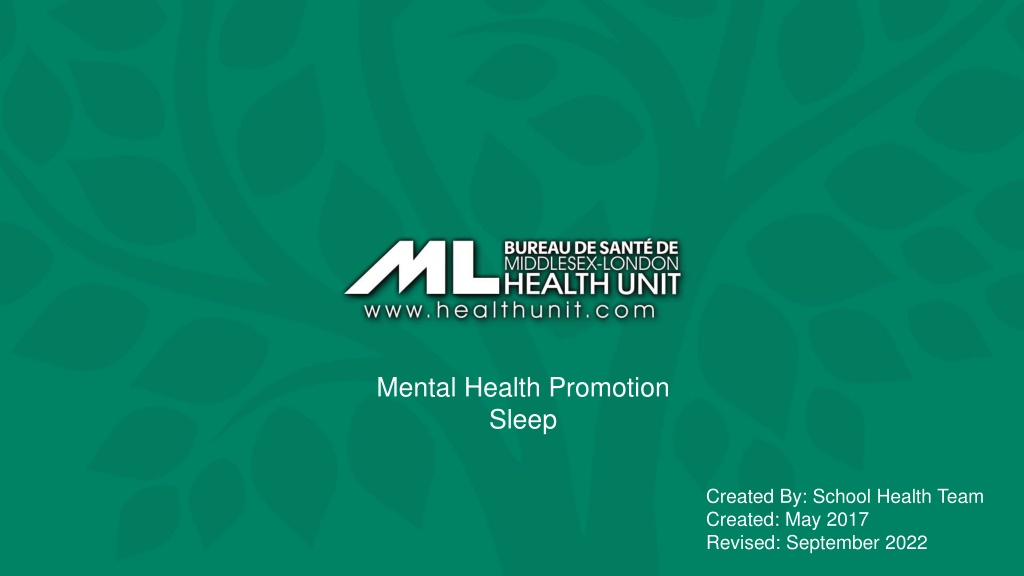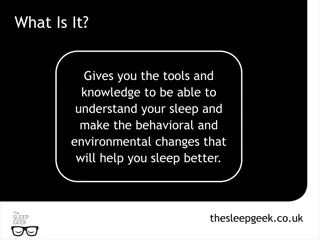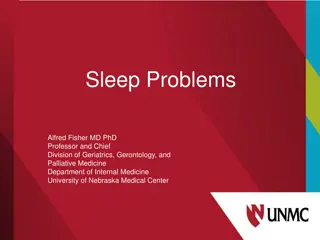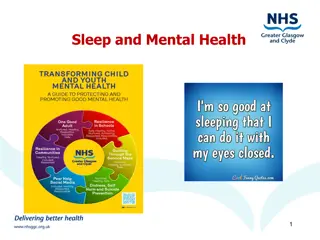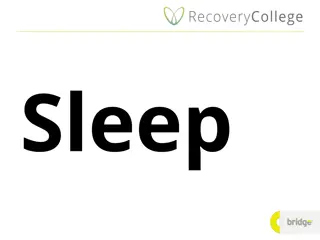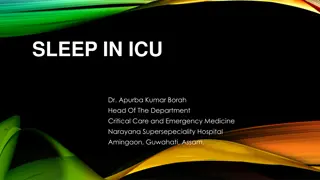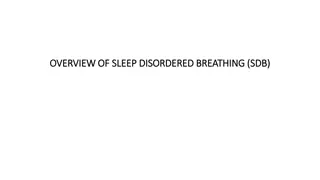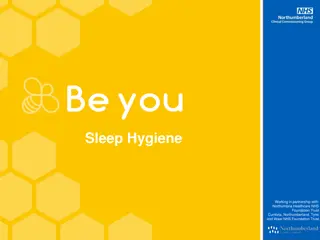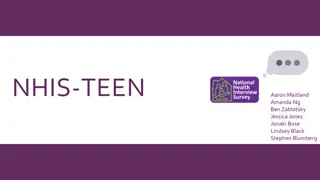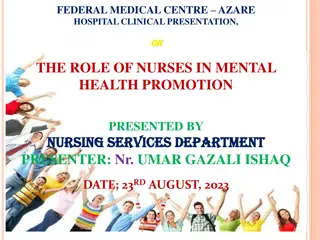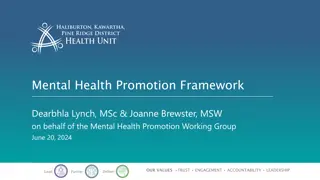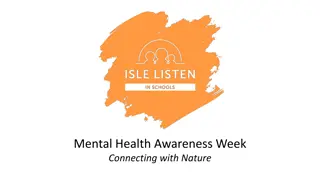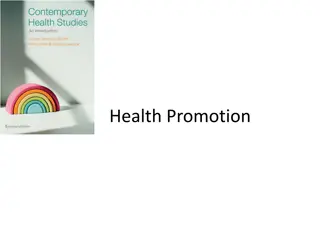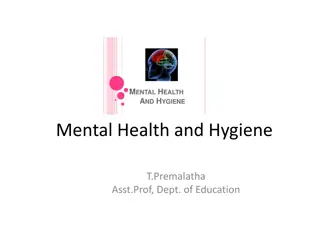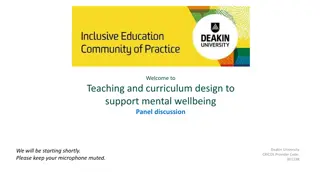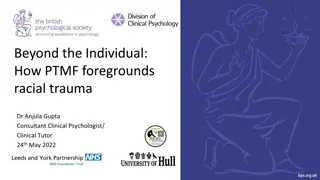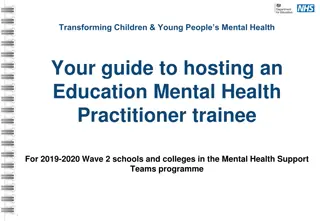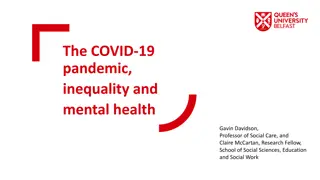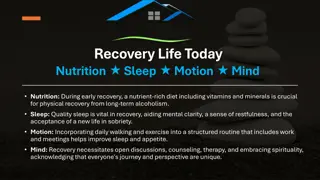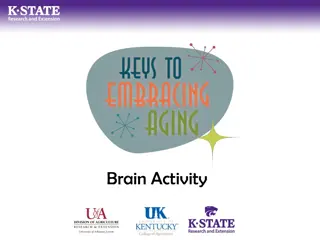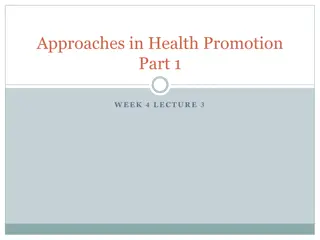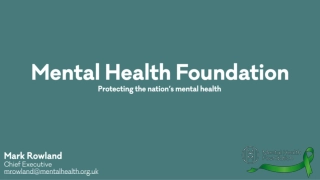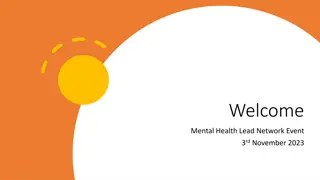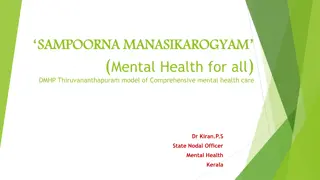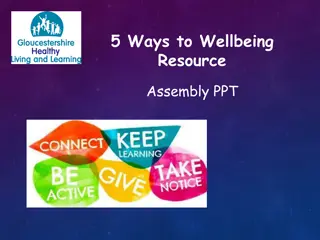Understanding the Importance of Sleep for Teen Mental Health Promotion
Explore the critical role of sleep in promoting mental health among teenagers. Learn about the effects of insufficient sleep, benefits of adequate rest, causes of poor sleep, and strategies for better sleep habits. Engage in activities and discussions to enhance awareness and well-being.
Download Presentation

Please find below an Image/Link to download the presentation.
The content on the website is provided AS IS for your information and personal use only. It may not be sold, licensed, or shared on other websites without obtaining consent from the author. Download presentation by click this link. If you encounter any issues during the download, it is possible that the publisher has removed the file from their server.
E N D
Presentation Transcript
Mental Health Promotion Sleep Created By: School Health Team Created: May 2017 Revised: September 2022
Class Overview Review of: How much sleep do you need? Effects of not getting enough sleep Benefits of getting enough sleep Causes of a poor sleep Impact of Caffeine & Nicotine Tips & Strategies for a better sleep Sleep Resources
Activity: Sleep Brainstorm Group 1- What are possible effects of not getting enough sleep? Group 2- What are the benefits of getting a good night s sleep? Group 3- What are the causes of poor sleep? Group 4- What are some tips for getting a good night s sleep?
How much sleep do you need? Sleep is very important for teens because the brain is beginning to mature How much sleep do teens need ? 8-10 hours
Not Getting Enough Sleep can: Affect your mood (anxiety/depression) Make it more challenging to manage stress Decrease energy levels Affect concentration, memory and focus Increase risk for accidents and injuries Slower reaction time and poor decision making Increase risk for illness and long-term health problems
Benefits Of Getting Enough Sleep Better mood (happier) Able to cope better with stress Increase energy More alert, better focus, concentration, and memory More productive and efficient Fewer accidents and injuries Decreased risk for illnesses & health problems
Sleep Routine Caffeine & Nicotine (After 3pm) Phones & Tech Devices Sleep Sleep Environment Large Meal Before Bed Napping (> 30 mins) Health & Illness Stress
Changes in the Sleep-Wake Cycle The hormone melatonin is produced in the brain and helps us fall asleep. Youth release melatonin much later in the evening. This causes a change in the sleep/wake cycle. Therefore, teens will Stay up later because they don t feel tired Feel very tired in the morning because they go to bed late Often sleep in on the weekend
Caffeine and Sleep Pop/soda, energy drinks, tea, coffee and even chocolate! Overuse can lead to difficulty falling and staying asleep (insomnia). Consuming caffeine to stay awake at night may lead to sleeplessness, anxiety, frequent nighttime awakenings, and overall poorer sleep quality. Caffeine stays in your system for a long time, therefore avoid caffeine at least 6 hours before bed.
Nicotine and Sleep Nicotine is a powerful stimulant with similar effect as Caffeine. Increased Blood Pressure & Heart Rate = More alert and awake. If you are having trouble with your sleep, it is likely because your body feels energized from the effect of the nicotine in your system.
Make a List & Plan Ahead Worries and tasks keeping you awake? Clear your mind. Write it down or make a to do list. Set your alarm and give yourself enough time to get ready. Organize your bag and make your lunch the night before. Sleep Bedtime Routine Calming Practices Environment Get Moving Go to bed and get up around the same time every day even on weekends! This will help your body develop a regular sleep rhythm. Create a routine (e.g. shower, snack, read). Your room should be cool and dark. Try using your bed for sleeping only. Watch TV on the couch or read in a chair. This will help your body associate your with sleep. Try and evening walk, read a book or magazine, stretch, meditation, deep and focused breathing exercises. Keep your body moving and get some fresh air outdoors. This will help you sleep better at night. Avoid strenuous exercise within 4hrs of bedtime. Avoid Nicotine Avoid Caffeine Nicotine is a stimulant that will make it harder to fall asleep and have a restful night. It can also irritate your nose, throat, and lungs which might affect your breathing. Sleep Tips1 Avoid caffeine 6-8hrs before going to bed. This includes coffee, tea, pop, energy drinks, chocolate, and some medications. Keep Bedtime Tech Free No Naps! No Clock Watching! Track Your Sleep Use an app or record in a journal. This may help you to discover patterns or factors affecting your sleep. Napping will cause the body to lose its sleep rhythm. If you feel tired, try re-energizing by going outside, taking a walk or doing something active. If you must nap, keep it to no more than 30 minutes. Food Turn off your phones, TVs and computers 1 hr before bed. Blue light makes it harder to fall asleep. Use an alarm clock instead of your phone. Being hungry can prevent a good night s sleep. Make sure to honour your bodies hunger cues and try a snack before bed. As tempting as it may be, avoid looking at the clock while falling asleep. It could make you anxious. 1. Centre for Clinical Interventions (2008). Sleep hygiene. Retrieved from http://www.cci.health.wa.gov.au Updated October 2022
How to Deal with Stress at Bedtime Everyone feels stressed or anxious at times. Instead of wondering why you are stressed, allow yourself to concentrate on what you will do about it. Schedule time during the day to talk with someone you trust- parent, teacher, friend- about what is bothering you. Keep a journal where you can write down thoughts or stressors. Create a to do list for the next day. You are less likely to stay up all night worrying about what needs to be done. Listen to relaxing music, take a shower, go for a walk.
Still not getting a good nights sleep? Assess your situation Try suggestions from this presentation See your school nurse Talk with your parent/guardian See your health care provider for a checkup- mental and physical health- and to talk more about your difficulties with getting a good night s sleep.
References Canadian Pediatric Society. Caring for Kids. Teens and Sleep. Why you need it and how to get enough. (2018) https://www.caringforkids.cps.ca/handouts/teens_and_sleep Harvard Medical School. Healthy Sleep. Twelve Simple Tips to Improve Your Sleep. (2007) http://healthysleep.med.harvard.edu/healthy/getting/overcoming/tips Harvard Medical School. Healthy Sleep. Understanding the third of our lives we so often take for granted. A division of sleep medicine from Harvard Medical School. http://healthysleep.med.harvard.edu/healthy/ Suni, E.( 2022) Teens and Sleep. An overview of why teens face unique sleep challenges and tips to help then sleep better. https://www.sleepfoundation.org/teens-and-sleephttps://www.sleepfoundation.org/teens-and-sleep Sutton, J. (2021) 20 Sleep Hygiene Tips and Worksheets for Kids and Teenagers. https://positivepsychology.com/sleep-hygiene- tips-kids-teenagers/ Teens and Young People from The Sleep Charity. ( UK) https://teensleephub.org.uk/teens-young-people/ Watson, S., and Cherney K., (2021). The effects of sleep deprivation on the body. Healthline Media. http://www.healthline.com/health/sleep-deprivation/effects-on-body
